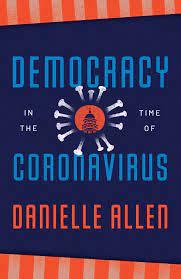Danielle Allen ’93 Critiques Government COVID Response in her Latest Book
The book: Nearly two years since the COVID-19 pandemic swept the U.S., Democracy in the Time of Coronavirus (University of Chicago Press) analyzes the victories and failures of the government’s response, including the debates over masks, inconsistencies in mandates, and the economic fallout. Danielle Allen ’93, an expert in politics, offers her perspective on what could have been done differently to respond better to COVID — and for future crises. Drawing on the history of past governance from ancient Greece to present day, Allen argues for a commitment to unity for our democracy to endure.

The author: Danielle Allen ’93 is the James Bryant Conant University Professor at Harvard University, where she is also the principal investigator for the Democratic Knowledge Project. She’s a graduate of Princeton; King’s College, Cambridge; and Harvard University. Among her many books, she is the author of Our Declaration: A Reading of the Declaration of Independence in Defense of Equality and coeditor of Difference without Domination: Pursuing Justice in Diverse Democracies. Allen launched a campaign for governor of Massachusetts, but dropped out of the race in February.
Excerpt:
When the new coronavirus arrived in the United States in January 2020, it hit an economy, society, and constitutional democracy fundamentally unprepared. As the scale of the challenge became clear, the country simply could not deliver what was needed to confront it. There was a solution, one identified by scholars and policy experts as early as the middle of March and publicly disseminated by the middle of April. That solution was a large-scale program of rapid testing of patients, tracing and testing their contacts, and tracing and testing their contacts again in turn. Such testing also needed reinforcement from a culture of adherence to universal precautions such as mask-wearing, hand and bathroom hygiene, and robust practices of infection control. The massive, rapid buildup of such a public health campaign, as well as the necessary infrastructure to support it, would have interrupted transmission of the virus sufficiently to eliminate it even while keeping the economy open. But the country did not have the relevant infrastructure ready to go and was not able to deliver this mobilization.
Just as the 2008 financial crisis exposed blind spots in how countries had thought about integrated markets through the first stages of globalization, within the first two months of 2020, the spread of COVID-19 revealed that the United States had another gaping vulnerability to globalization. Like opaque securities, pandemics proved to be a dangerous feature of globally integrated markets. We learned that, given the modern structure of travel, transportation, and integrated economies, infectious pathogens travel as easily as the Davos elite.
The near-term challenge of January 2020 was identical to our long-term challenge: how to achieve pandemic resilience — the ability of our social and political institutions to process a major exogenous shock yet keep all essential functions operating, while simultaneously protecting lives, livelihoods, and liberties. The urgency of the crisis meant that we needed to deliver the durable infrastructure of resilience in the form of emergency response. But the near-term nature of the crisis situation by no means required that the response to it should consist only of transient initiatives. Emergencies have always provided opportunities for durable innovation.
Look back to antiquity. The Romans’ Appian Way, their first major road, was built in 312 BCE as a supply line during the Second Samnite War. A crisis response yielded durable infrastructure. Of course, the same kind of thing happened with penicillin and nuclear power in World War II (Conant 2017; Johnstone-Louis et al. 2020). A crisis will by its nature elicit reactive action of some kind. The question is only whether in its reactions a society lays down a foundation for a better future or expends its energies on changeable, flailing efforts. In our own situation, the effort to find a vaccine to protect against COVID-19 is another good example of an emergency yielding a permanent advance. The Moderna variant uses a technology, synthetic messenger RNA, that has never before been used for vaccine production (Garde and Saltzmann 2020). In all likelihood we will leave this crisis with an important new tool firmly entrenched in the health-care toolkit. We could have and should have done the same with the infrastructure of public health.
In this book, I hope to lay the foundation for a renewed social contract capable of delivering pandemic resilience—and, more generally, both justice and health for our constitutional democracy. I hope to offer a durable breakthrough in the form of a fresh vision of the public good.
What exactly is a social contract? A social contract is the set of rights and mutual responsibilities that we have among ourselves as citizens in a constitutional democracy. A social contract is both what’s asked of us as participants in a constitutional democracy and all that is made possible for us by virtue of our participation in that constitutional democracy. What’s asked of us and what we receive establish relations of reciprocity within the citizenry. This book seeks to reset that relationship for a healthy and just future.
The pandemic revealed that our social contract is fundamentally broken. Our society includes people who are being asked to follow the law and to pay taxes but who are not in return receiving the opportunity and security promised by our arrangement of mutual rights and responsibilities. The elderly and essential workers, for instance, have been left exposed to the pandemic. We have seen disparate impacts on communities of color, because underlying foundations of health have not been adequately established for low-income workers. When crisis hit, the society that promised to protect all did not in fact protect many of its members.
To repair our social contract, we need to understand the goals and responsibilities of public decision-makers and democratic citizens in a constitutional democracy in a time of crisis. We need to understand the vulnerabilities in our society that left us ill-equipped to fulfill those responsibilities. These are the subjects of chapter 1. We need to acknowledge what kind of public health strategy would have fulfilled those goals and responsibilities in response to this crisis, and we need to explore why we failed to adopt this strategy. These are the subjects of chapter 2. We need to learn how to use the machinery of our political institutions to deliver on those goals more effectively, if not now, in this crisis, then going forward. This is the subject of chapter 3. Once we take these steps, we will be able to sketch out the parameters of a transformed peace, a social contract that delivers pandemic resilience and, more generally, justice and health for our constitutional democracy on the foundation of a fair and flourishing economy. I offer that sketch in chapter 4.
Pandemic resilience requires public health infrastructure, of course, but also, and this will be my focus, a healthy social contract—good governance and bonds of solidarity and mutual commitment within the population, connected to love of country. Solidarity is the resource that enables people to make small sacrifices of liberty so as to avoid harm to others with whom they have a social bond. We convey our love of country through acts of solidarity to the other members of our polity. We have many reasons to want to benefit from a globally integrated economy and from the opportunities for human connection it brings. Yet we rightly wish to avoid being existentially vulnerable to its accompanying dangers. The goal is a framework for delivering a transformed peace, a postpandemic state in which, as a society, we would be less vulnerable to injury because we would be stronger as a society. We would have more civic strength by virtue of having a healthy social contract, supporting both good governance and solidarity.
Reprinted with permission from Democracy in the Time of Coronavirus by Danielle Allen, published by The University of Chicago Press. © 2022 by Democratic Knowledge, LLC. All rights reserved.
Reviews:
“Political theorist Allen shrewdly analyzes how and why the U.S. response to COVID-19 fell short, and suggests what should be done to better prepare for the next pandemic… This is a trenchant call for reimagining how America functions in a time of crisis.” — Publishers Weekly
“In this stirring manifesto, the renowned political theorist Allen argues that the United States’ woeful response to the COVID-19 pandemic must serve as a wake-up call for Americans to rebuild their public health infrastructure and renew their constitutional democracy.” — Foreign Affairs












No responses yet